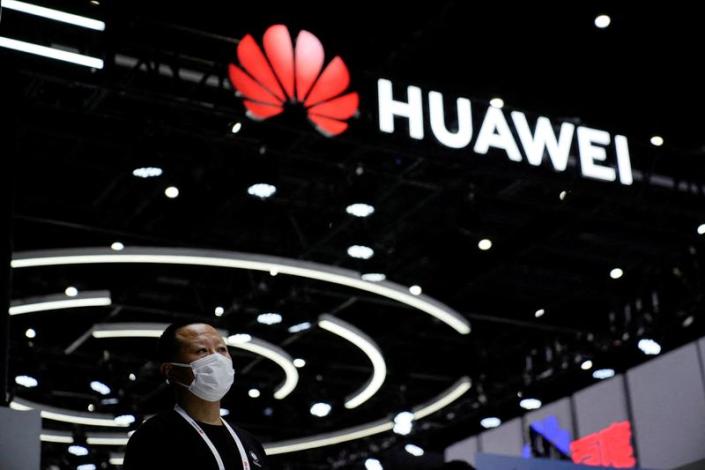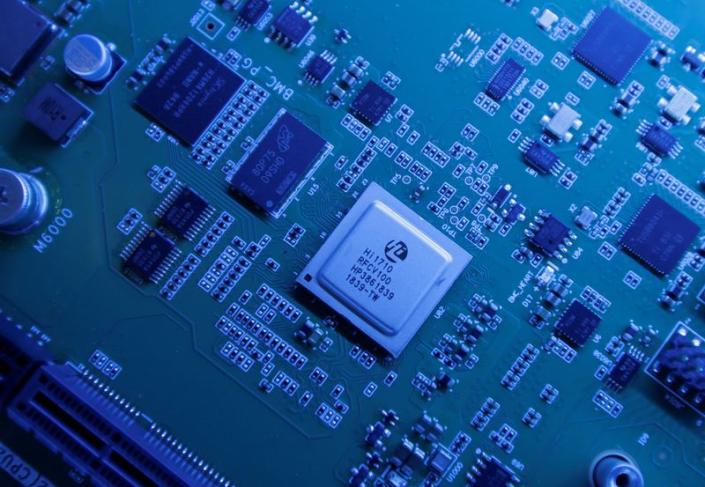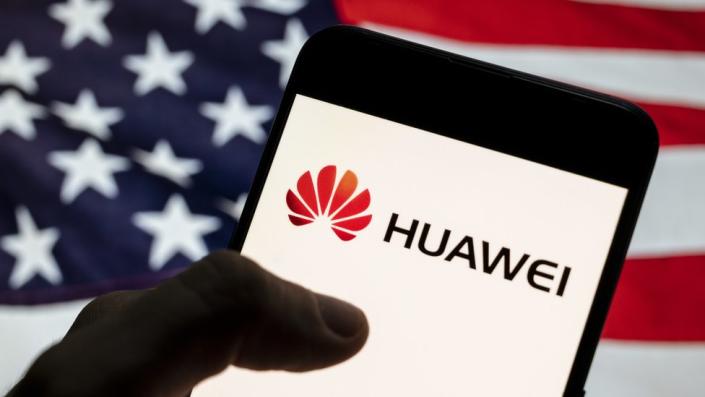U.S. stops granting export licenses for China's Huawei - sources


Hi1710 BMC management chip is seen on a Kunpeng 920 chipset designed by Huawei's Hisilicon subsidiary is on display at Huawei's headquarters in Shenzhen
Mon, January 30, 2023
By Karen Freifeld, Alexandra Alper and Stephen Nellis
(Reuters) -The Biden administration has stopped approving licenses for U.S. companies to export most items to China's Huawei, according to three people familiar with the matter.
Huawei has faced U.S. export restrictions around items for 5G and other technologies for several years, but officials in the U.S. Department of Commerce have granted licenses for some American firms to sell certain goods and technologies to the company. Qualcomm Inc in 2020 received permission to sell 4G smartphone chips to Huawei.
A Commerce Department spokesperson said officials "continually assess our policies and regulations" but do not comment on talks with specific companies. Huawei and Qualcomm declined to comment. Bloomberg and the Financial Times earlier reported the move.
One person familiar with the matter said U.S. officials are creating a new formal policy of denial for shipping items to Huawei that would include items below the 5G level, including 4G items, Wifi 6 and 7, artificial intelligence, and high-performance computing and cloud items.
Another person said the move was expected to reflect the Biden administration's tightening of policy on Huawei over the past year. Licenses for 4G chips that could not be used for 5g, which might have been approved earlier, were being denied, the person said. Toward the end of the Trump administration and early in the Biden administration, officials had still granted licenses for items specific to 4G applications.
American officials placed Huawei on a trade blacklist in 2019 restricting most U.S. suppliers from shipping goods and technology to the company unless they were granted licenses. Officials continued to tighten the controls to cut off Huawei's ability to buy or design the semiconductor chips that power most of its products.
But U.S. officials granted licenses that allowed Huawei to receive some products. For example, suppliers to Huawei got licenses worth $61 billion to sell to the telecoms equipment giant from April through November 2021.
In December, Huawei said its overall revenue was about $91.53 billion, down only slightly from 2021 when U.S. sanctions caused its sales to fall by nearly a third.
(Reporting by Chavi Mehta in Bengaluru, Stephen Nellis in San Francisco, and Alexandra Alper and Karen Freifeld in Washington; Additional reporting by David Kirton in Shenzhen; Editing by Shailesh Kuber and Stephen Coates)
University of Technology Sydney Associate Professor Zhang on tech curbs on China
Marina Yue Zhang, Associate Professor at the Australia-China Relations Institute of the University of Technology Sydney, says that imposing more tech restrictions on China is not the right strategy for the world, after sources say the Biden administration is considering a full Huawei ban. She speaks to Rishaad Salamat and David Ingles on "Bloomberg Markets Asia."
Japan's chip equipment makers in the dark about new China export restrictions
Mon, January 30, 2023
TOKYO (Reuters) - Japanese makers of semiconductor manufacturing machinery and materials used to make chips said on Monday they had yet to hear from Japan's government about export restrictions that could directly or indirectly affect their business in China.
Reuters contacted 10 chip-related companies, of which five - Advantest Corp, Nikon Corp, Resonac Holdings Corp, Lasertec Corp and Shin-Etsu Chemical Co Ltd - said they were unaware of any contact from Japan's Ministry of Economy, Trade and Industry about any new restrictions reportedly agreed by Japan, the United States and the Netherlands last week to stymie rival China's technological advancement.
"As we do not know what the situation is, we cannot comment on what the impact is and what our response will be," said a spokesman for Advantest, which makes chip-testing machines and other chip-related equipment.
Past restrictions on advanced semiconductor shipments to China have not affected Japan because the country, which once dominated global chip manufacturing, now only makes around a 10th of the world's semiconductors, most of them less advanced than the chips made by the likes of Taiwan Semiconductor Manufacturing Co Ltd (TSMC) and South Korea's Samsung Electronics Co Ltd.
Japan, however, is a major supplier of machines used to make those leading-edge semiconductors that could come under restrictions following reports Washington and other governments had agreed on a deal to curb their exports to China.
"South Korea has constantly beaten Japan in semiconductors all these years, but one thing they don't have is steppers," which are used to project electronic circuits on to silicon plates, said Tokai Tokyo Research Institute analyst Masahiko Ishino. Without knowing the details of any new restrictions it is impossible to know their impact, he said.
Dutch company ASML Holding NV, a key supplier to chipmakers, said on Saturday it "understood" that progress had been made towards an agreement among several governments.
Its statement followed a Bloomberg report that the United States had secured a deal with the Netherlands and Japan.
The five other Japanese firms Reuters contacted did not respond when asked about the possible impact of tighter export rules and whether they were concerned China would retaliate. Among them was Tokyo Electron Ltd, Japan's biggest semiconductor manufacturing machinery maker.
Shares of Japanese semiconductor equipment makers were mostly flat on Monday, with Tokyo Electron up 0.68% while Advantest Corp fell 0.32%. Nikon Corp was up 0.16%, in line with the benchmark Nikkei average.
(Reporting by Tim Kelly, Mayu Sakoda, Kiyoshi Takenaka and Mariko Katsumura; Editing by Chang-Ran Kim and Christopher Cushing)
China accuses Washington of abusing export controls
Mon, January 30, 2023
BEIJING (AP) — China’s government on Monday criticized U.S. controls on technology exports as a trade violation, after Japan and the Netherlands agreed to join Washington in limiting Beijing’s access to materials to make advanced processor chips they say can be used in weapons.
The Foreign Ministry didn’t mention the latest development but accused Washington of abusing export controls and organizing other governments to “maintain its hegemony” and contain China.
The United States is trying to block China from acquiring the most powerful processor chips and technology that would help its fledgling industry develop the ability to make them. Washington says they can be used to make weapons and to facilitate the ruling Communist Party’s surveillance and human rights abuses.
“This seriously violates market principles and international trade order,” said a ministry spokeswoman, Mao Ning. She said it “undermines the stability of global industrial and supply chains.”
A person familiar with the agreement told The Associated Press on Sunday that Japan and the Netherlands, important suppliers of technology and raw materials to make chips, agreed to join in U.S. controls.
Mao gave no indication how Beijing might respond to tighter export controls.
The Communist Party has invested billions of dollars to develop its own chip industry, but its vendors still need foreign manufacturing equipment, raw materials and other technology.
Industry experts say Chinese producers are improving but cannot make chips required for the most advanced smartphones and other products.
The Associated Press


No comments:
Post a Comment